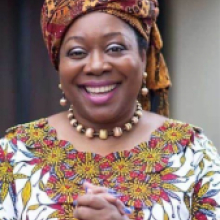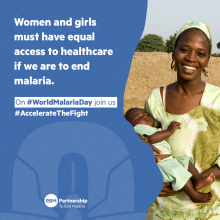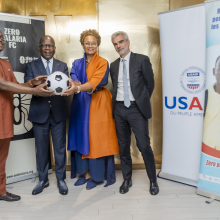Working to end infectious diseases is vital if we are to meet the Sustainable Development Goals. As the former minister of health for Guinea, I have seen firsthand the impact these diseases can have on a country and the financial and human resources required to end them for good.
The 2014-2016 Ebola crisis was one that the world watched unfold with alarm, and the response and coordinated effort from in-country programs and international support was hugely important in getting the epidemic under control. According to the World Health Organization, deaths from Ebola totaled over 11,000 throughout this period, and the disease is now threatening to gain momentum once again.
Yet, while the world springs to action to effectively respond to the growing threat of Ebola in West Africa, we continue to remain complacent about the hundreds of thousands more people dying each year from malaria.
As well as saving precious lives and strengthening health systems within countries, defeating diseases such as Ebola and malaria provides each nation wider economic benefits. This allows them to free up resources to address other developmental priorities, improve worker productivity, and increase school attendance. Free from the threat of these devastating diseases, citizens are likely to enjoy better health and happiness.
When it comes to malaria, while this disease remains one of the world’s deadliest killers, causing more than 400,000 deaths worldwide in 2017, we have achieved remarkable success against the mosquito and its deadly bite. Since 2000, international efforts have saved more than 7 million lives and prevented 1 billion additional cases around the world.
Globally, more countries are close to elimination than ever before with more than half now malaria-free. By 2020, more than 10 countries that had malaria in 2015 will have reached zero malaria cases as a result of persistent and focused efforts. Just last week, at the third annual global forum of malaria-eliminating countries convened by the World Health Organization, the new “E2020” report revealed that China and El Salvador have achieved two consecutive years of zero malaria cases, and that Malaysia, Timor-Leste, and Iran will reach zero cases for the first time too.
At the World Health Assembly in Geneva, Switzerland, this year, Argentina and Algeria joined a growing list of countries that have defeated the disease. This means Algeria is the third country in Africa to be officially recognized as malaria-free, whilst Argentina is the second country in the Americas in the last 46 years to achieve this status.
These two countries join Uzbekistan, Paraguay, and Sri Lanka in the list of nations that have defeated this disease in the past three years. In all cases, the fight has not been easy and the reasons for success have been varied. Ingredients for successful malaria elimination include strong political leadership and persistence, increased domestic and international resources, strong health systems, access to free services, community health workers, and transborder cooperation.
In Algeria, much of the success can be attributed to having a well-trained health workforce, rapid diagnosis, swift action and the commitment of national partners. In Uzbekistan, consistent support from the Global Fund to Fight AIDS, Tuberculosis and Malaria helped the country stamp out the disease through an innovative, results-based approach.
In Paraguay, community workers have been identified as a key success factor. Throughout the country, policymakers, health workers, and thousands of volunteers joined forces to treat, track and eliminate the disease for good.
One of the key reasons for Argentina’s success was cross-border collaboration. Between 2000-2011, Argentina worked side by side with Bolivia to spray more than 22,000 homes in border areas and conduct widespread malaria testing. This shows why collaborative malaria projects such as the Sahel Malaria Elimination Initiative, and the recent joint bed net mass distribution campaign between The Gambia and Senegal, are more important than ever.
While we rightly celebrate these recent successes, still more remains to be done.
Malaria-affected countries need to learn lessons from experiences elsewhere, particularly when it comes to adopting good practice.
Those that aren’t on the verge of elimination can take inspiration from knowing that elimination is possible and now, more than ever, must we work to shrink the malaria map. We are at a critical juncture in our fight, with the leading source of international funding, the Global Fund, due for replenishment this year, and malaria cases rising in some high burden countries.
It is crucial that we maintain momentum and do not let the progress of the last 20 years slide, as we face the tantalizing prospect of being able to end malaria within a generation. To do this requires collective global effort.
When we work together, we are stronger. Countries that have succeeded in reaching zero cases and have been certified as malaria free demonstrate the power of collective and collaborative action and set the bar for others to reach and end malaria for good.
Latest Blogs



